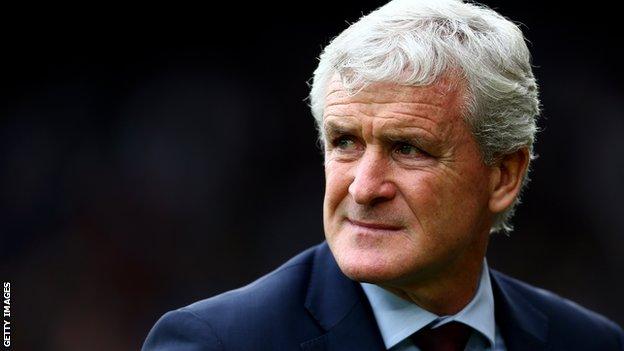Mark Hughes: Ex-Manchester City boss calls for greater suicide awareness
- Published

Mark Hughes said it is important that managers 'improve our emotional intelligence'
Managers must understand that their decisions can "cast shadows" regarding players' mental health, says former Manchester City boss Mark Hughes.
Suicide is the biggest killer of men under 49 and women aged 20 to 34 in the United Kingdom.
The world of football has also been impacted by high-profile deaths in the past.
"It's vitally important that young players right through football get the support they need," Hughes said.
"A lot of clubs have provision of player welfare and have actual departments that address that. But clearly, the resources of all clubs aren't the same.
"It's difficult for football clubs. There are lot of emotions and disappointments, more disappointments than successes if we're honest, and it's about being able to recognise when somebody's struggling with those disappointments when maybe they're losing their job."
Hughes was speaking after the League Managers' Association announced it was joining Greater Manchester's Health and Social Care Partnership to raise awareness of their Shining a Light on Suicide campaign, external.
Andy Burnham, Mayor of Greater Manchester, said getting football managers to talk about suicide was "priceless" because of the game's popularity and their influence on young men and women.
Managers, including Hughes, are able to become 'suicide aware' through a 20-minute training course, and the former Manchester United, Barcelona and Chelsea forward said it was an example of how the approach to mental health in football had changed since he was a player.
'Greater empathy and understanding needed'
Gary Speed, Hughes' former Wales team-mate, was found dead at his home in November 2011 but a coroner said he was not satisfied that the former Wales manager intended to kill himself.
Hughes added: "I've had team-mates that have struggled with mental health and lost their lives to suicide and it's very difficult, but this campaign is really important.
"Certainly, we have an opportunity given the role we have [as managers] within clubs to help.
"Sometimes it's difficult to know what to say at the right time. Sometimes you're not in a position to affect the feelings of somebody who's struggling but we just need more knowledge.
"We need greater empathy, and more understanding of how we cast the shadows sometimes as managers when we make decisions. We can all improve our emotional intelligence, and, if we do that, then we're going to be best served in recognising when people are struggling."
LMA chief executive Richard Bevan said the managers' body had been on a "steep learning curve" after former Leyton Orient manager Martin Ling, now the club's director of football, spoke about his mental health issues.
Bevan added: "Martin has spoken really well about his situation; we have been on a steep learning curve over recent years. It's about 'don't do it on your own', making sure that managers and coaches have the right toolkit to survive and thrive in the game.
"We focus on providing mentors, personal development and support. That's one of the lessons that Martin has helped us learn and at the LMA we have over 50 professionals that support managers and coaches so they don't feel on their own."
If you or someone you know is struggling with issues raised by this story, find support through BBC Action Line.